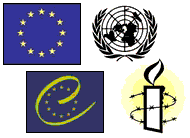Human Rights Watch
Created | Updated Apr 28, 2005

Nepal: On the Nepalese New Year, April 13th, police attacked 18 metis - a term describing men who dress and identify as women - who were on their way to a party. Nine of the group were severely beaten with batons, gun butts, and sticks. They tried to report the incident to the police but were denied entry to the police station. Their injuries were treated and recorded at the local hospital though.
This is a country where civil liberties have been suspended by the King and is only the latest assault by police against transgendered people. On December 12th 2 metis were attacked by 15 policemen. They were taken to a large field where they were threatened with guns, beaten and raped, even though they showed police IDs.
Back on August 9th, 39 metis were held in the police station for 2 weeks without adequate food. They were all members of the Blue Diamond Society which supports sexual rights and sexual health. Subsequently this organization has been under continued attack. Nepals' criminal code contains a prohibition against 'unnatural sex' which it says the Blue Diamond Society violates. After a rally in July last year a private lawyer petitioned to have the society banned because of this. The Ministry of Home Affairs responded to international pressure and said it would not support banning the group. However, the case is still open and another hearing is due on May 10th.
USA: Last year the death penalty was halted in New York state as it was ruled unconstitutional. An attempt was made on April 12th to restore it, but happily it failed. Prominent legislators have changed their opinions due to flaws which could allow innocent people to be executed.
Pakistan: Thousands of supporters of the opposition party, Pakistan Peoples Party (PPP) were arrested last week to prevent them from greeting Asif Zardari, the PPP leader and husband of former Prime Minister Benazir Bhutto, on his return from a trip to Dubai to meet his family. Some PPP supporters did manage to reach the party headquarters and were dragged away by police; many were also beaten, 3 women have been hospitalized. Journalists were also detained and their equipment was taken from them and footage was destroyed.
The government has offered to release the PPP members of parliament which it arrested and 600 party activists have been bailed but there is no news on the thousands in custody in the Punjab and Sindh provinces. In the Punjab there is a law against the gathering of more than 4 people, which is usually not imposed, but the police used it on instructions from the government to allow them to set up roadblocks and checkpoints.
Tunisia - a Success Story?: Human Rights Watch released a report on April 20th which detailed conditions in Tunisian prisons. Although Tunisia had denied holding prisoners in solitary confinement it appeared that dozens were being held that way, sometimes for over a decade. The prisoners were all from the banned Nahdha (Renaissance) party. Jailing them was part of the governments' campaign against the Islamist movement. They were never told why they were in solitary confinement, how long they would be there or how they could appeal against it.
Since the release of the report, Tunisia's government has announced that it will no longer place prisoners in solitary confinement for more than 10 days. They also approved access for Human Rights Watch to those prisoners who have been detained for years in solitary. Officials said the new practice would start on April 20th, straight away. The last time an independent human rights organization was allowed to visit the prisons was in 1991.
It is great to see that these reports and the pressure can lead to victories. I hope that this one continues and we hear of more access and justice in the Tunisian jails.
UN Commission on Human Rights: The year's session ended on April 22nd without addressing many of the serious human rights situations around the world.
Several governments including the European Union, United States and Canada, announced that they did not intend to introduce resolutions critical of human rights situations in China, Iran, the Russian Federation in Chechnya, Turkmenistan, Uzbekistan, and Zimbabwe.
The international community did overwhelmingly approve the appointment of a special rapporteur on human rights and counter-terrorism, with nearly 80 countries signing on, including the United States and Russia, who were tirelessly pushed by Mexico. The special rapporteur's mandate is to monitor a states' compliance with human rights in the way they battle terrorism.
There will also be a UN human rights operation in Nepal, which will monitor violations by both the government and the Maoist insurgents. Nepal also intends to address the deteriorating human rights situation existant since February 1st this year. This action was orchestrated by Switzerland, a new member. It shows that countries can have a huge effect on human rights conditions if they choose to.
Cuba tried to make a resolution for access to Guantanamo Bay prisoners, but was defeated as the USA will not allow any access to its own prisons.
A watered down resolution was passed on the situation in Darfur, Sudan. Other resolutions were also passed on human rights monitoring of North Korea, Myanmar, Cuba and Belarus. A resolution against torture spoke against sending suspects back to abusive countries where they risk torture. The commission remained silent on human rights abuses relating to sexual orientation and gender identity, although they did try to condemn extrajudicial killings of transgender people. This was, however, blocked.
The Landmine Survivors Network: This group has hosted an art exhibition in Sarajevo of the artwork of those who have survived mine blasts.
Tibet To keep up-to-date with the human rights issues in Tibet
please refer to Tibet News by John–the-gardener.
Information and Links

